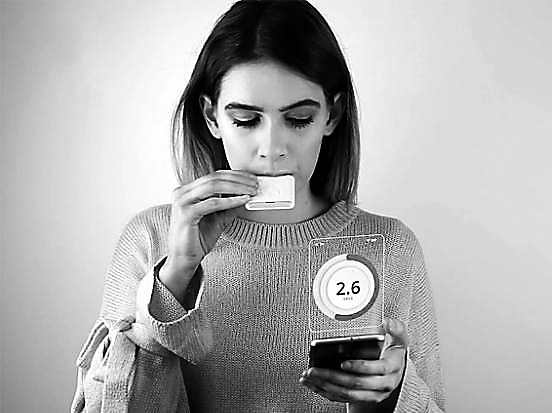
INDIGESTION, stomach cramps and constipation are all signs of irritable bowel syndrome (IBS), a digestive condition estimated to affect one in 10 people worldwide. Discovering which foods trigger a bad reaction for individuals can be a long and painstaking process. It’s expensive too. That’s why Irish engineers Aonghus Shortt and Peter Harte founded FoodMarble, a startup that has invented a portable device, measuring just 5 centimeters squared, which tests the hydrogen levels in a person’s breath, a key signal for digestive disorders. “Humans shouldn’t be producing hydrogen on the breath,” explains Harte. It happens when food that couldn’t be digested in the small intestine moves to the large intestine where bacteria breaks it down, in a process called fermentation. That process releases gases, such as hydrogen or methane, that can cause pain or bloating. FoodMarble’s AIRE device, which launched in 2018, allows users to test for hydrogen after meals, giving them real-time feedback on what food is bad for their body. Readings are transmitted via Bluetooth to the FoodMarble app, where users can log what they eat, and over a course of weeks spot the ingredients that trigger symptoms. Hydrogen breath tests have long been a method for diagnosing digestive conditions like lactose intolerance and more recently small intestinal bacterial overgrowth (SIBO), says Harte. But he adds that the technology has not been widely accessible or convenient, often requiring multiple trips to the hospital for testing. “By miniaturizing this, our aim is to democratize the technology,” he says. “We’ve got this huge cohort of patients who just haven’t had a way to overcome these difficult conditions. Our device is easy to use and it gives them hope.” FoodMarble has sold 25,000 breath sensor devices and has just opened pre-orders for a new version that also measures methane levels. They are available worldwide and cost between US$190 and US$260. But the company is also looking to enter the clinical market and its technology is currently undergoing trials at Johns Hopkins Medicine in the United States to improve the diagnosis of SIBO. Pankaj Jay Pasricha, the professor leading the trial, says that so far, the device has outperformed other hydrogen breath test methods. Tara Troy, a gastroenterologist who runs the Comprehensive Gastrointestinal Health clinic in Northbrook, Illinois, believes that a take-home, reusable device could be hugely beneficial to clinicians and patients alike. “The attraction of the FoodMarble device is that it’s not just a one-time analysis of the breath,” she says. “A person could use it multiple times to gather multiple data points on which to make better judgment calls and assessments about food sensitivities.” (SD-Agencies) | 
